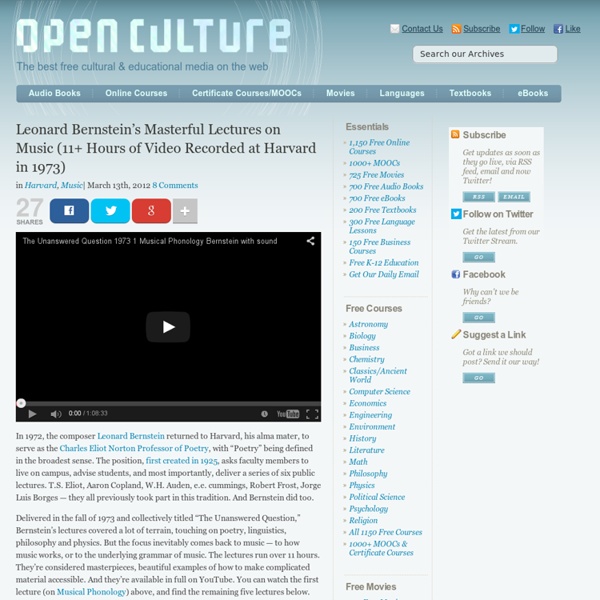Leonardo Da Vinci's wacky piano is heard for the first time, after 500 years
Take a bow: The viola organista's strings are played in the same way as a cello. Photo: Tomasz Wiech/AFP A bizarre instrument combining a piano and cello has finally been played to an audience more than 500 years after it was dreamt up Leonardo da Vinci.
IRANIAN PROGRESSIVE MUSIC / FUSIONS & ROCK
When in 15th century Western civilisation laid its first fundaments, it used many ideas which were developed and described in some Middle Eastern writings. Not only the re-establishment of Greek philosophical fundaments, the principles of justice and many other developments were adapted and further developed. Also fundaments of music were built and directly influenced by some ideas from the Middle East (especially the use of drums and rhythm is more often mentioned). Different to Arab languages Persian language, especially the older form, has the fundaments and origin of as various other Western languages. In various periods communicating and developing ideas together over the entire world was normal. This still is the case, except that rulers often limit the amount of communication, creativity and of the feeling there is an existence of an interconnected creativity net possible.
750 Free Online Courses from Top Universities
Advertisment Take online courses from the world’s top universities for free. Below, you will find 1,700 free online courses from universities like Yale, MIT, Harvard, Oxford and more.
Music and Architecture: Confronting the Boundaries between Space and Sound
Professor Jonathan Cole My talk this evening is an exploration of the relationship between physical space and musical space. I will explore some of the links which exist between musical composition and architecture. I will look at how composers have used physical space within their methodology and how the architecture of our environment can open up new possibilities within the development of musical ideas. At various points within the lecture, in order to provide some respite, I will be playing excerpts of a selection of pieces which explore the ideas of musical space in individually imaginative ways. Obviously, with a stereophonic setup, it is impossible to experience the specific spatial arrangement of these pieces, and a lack of time means I cannot play extensive excerpts.
Rhythm / Pitch Duality: hear rhythm become pitch before your ears
I just got home from a five-week tour in Europe and finally have some time to do what I call research. The way I see it, being a touring musician is a bit like being a scientist: you spend a bunch of time in the lab, and you find something that you’re excited about; then you have to go out and give a bunch of seminars to tell the world about it. But very soon you’re itching to get back to the lab, because you want to discover the next thing.
Dirty Laundry : The Soul Of Black Country.(2005)
( Country Soul - Southern Soul ) l Killer Collection Of Country Soul From The 60's And 70's 1. Ella Washington: He Called Me Baby 2.
Train//Tracks
Train//Tracks is an album-length collection of field recordings which captures the performances and environment of busking musicians in Chicago's underground train stations. The noisy interplay of the trains themselves becomes an integral part of the mix while providing natural transitions. Chicago's deep and rich musical tradition extends into the city streets and far underground to the train stations where buskers play for ever-shifting crowds. Stop to listen and one finds a unique patchwork of classic and contemporary musical influences drawn from around the world.
The Soul of Black Country
Get off yer horse and check out a few samples from volume one of the two-volume Dirty Laundry compilation that rounds up a collection of black country-soul nuggets, both covers and originals (James Brown covering Hank Williams, anyone?), from the sixties and seventies. Thanks to mr. Ryan for the turn-on. Download: MP3:
Mehdi Hosseini
Seyed Mehdi Hosseini Bami (born July 10, 1979, Persia, Tehran, Persian: سید مهدی حسینی بمی) is a Persian composer of contemporary classical music. Biography[edit] Hosseini received his Masters degree and Doctor of Music degree (DMA) in Composition from Saint Petersburg State Conservatory,[1] named after N. A. Rimsky-Korsakov.[2] His major teachers include [3] Farhad Fakhreddini, Prof. Alexander Minatsakanian, Prof.
s History of Country Music
Introduction Welcome to Roughstock's History of Country Music! This is the only country music history site on the Web, brought to you by the world's #1 Country and Western Site: Roughstock. This exhibit looks at some of the influential artists and songs of the late 1920's through the year 2000, era by era.
Physicists Find Evidence That The Universe Is A 'Giant Brain'
The idea of the universe as a 'giant brain' has been proposed by scientists - and science fiction writers - for decades. But now physicists say there may be some evidence that it's actually true. In a sense. According to a study published in Nature's Scientific Reports, the universe may be growing in the same way as a giant brain - with the electrical firing between brain cells 'mirrored' by the shape of expanding galaxies.



